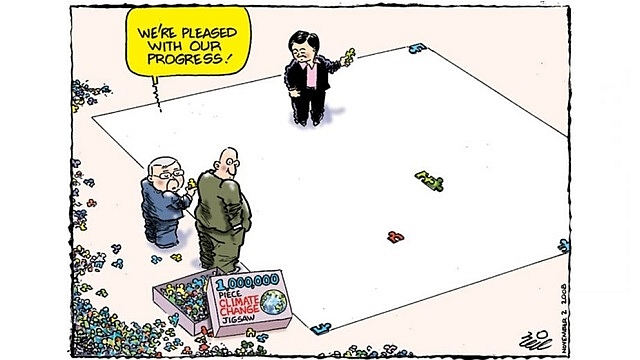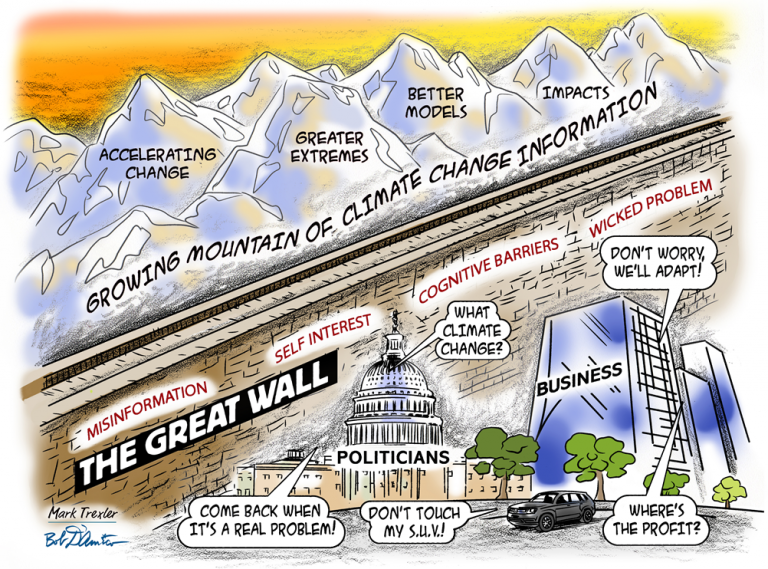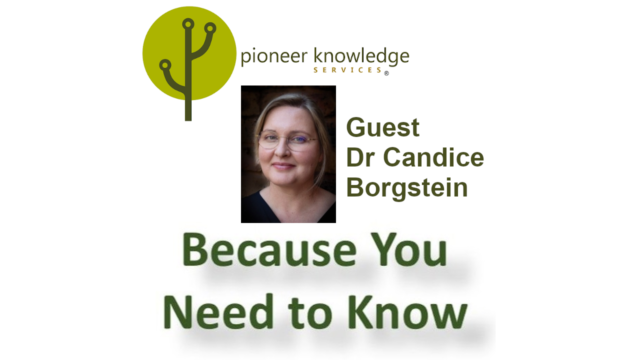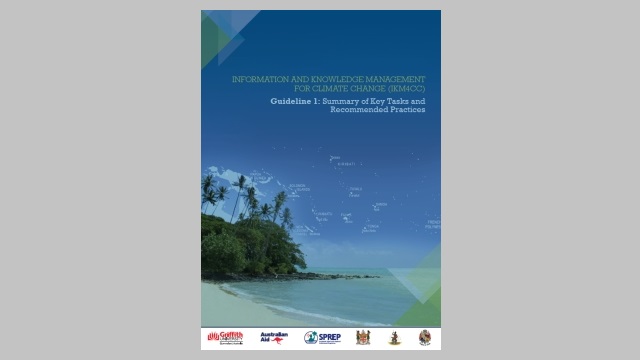
Does information matter for completing the 1,000,000 piece climate change jigsaw puzzle?
We’re doing very poorly at completing the 1,000,000 piece climate jigsaw puzzle envisioned above by Australian cartoonist Neil Matterson, a cartoon that remains as relevant today as it was when it was drawn nine years ago.
I’ve suggested that people who want to influence climate change outcomes should attend climate puzzle school to learn more about the unique challenges of completing a 1,000,000 piece puzzle, and how they can help beyond the individual puzzle piece they may already be working on.
My “The Great Wall” cartoon zeroes in on one of the most important topics for puzzle school to cover, namely how to help climate change decision-makers get the “is it worth it?” and “can I do it?” information that underlies all human decision-making (see the 2013 book Influencer: The New Science of Leading Change). Answers to those two critical questions need to find their way from the “growing mountain of climate change information” through, over, or under “The Great Wall” to individuals making climate-relevant decisions.
The challenge doesn’t stem from an information shortage—rather, it’s the opposite. Individuals working on the 1,000,000 piece climate jigsaw puzzle are a veritable information generating machine, using thousands of venues to generate and distribute a virtual infinity of climate-relevant information. From books to reports to videos, blogs, and news stories, any decision-maker with any interest in the topic will likely find herself deluged with information.
The “Great Wall” in my cartoon is obviously metaphorical, but it might as well be as real. Enormous quantities of information do spill over the wall, one symptom of which is that decision-makers turn up millions of hits in connection with any online search. Regardless of whether that decision-maker is an individual purchasing a car, a business executive interested in assessing climate risks, or a policy-maker considering a legislative proposal, the likelihood that he or she will ever see the best available answers to their own “is it worth it, can I do it?” questions is vanishingly small. Which in turn dramatically biases decision-making outcomes against being as “climate-friendly” as they could be.
Information overload is certainly important in explaining our relative lack of action on climate change, as suggested by Neil Matterson’s 1,000,000 piece jigsaw puzzle cartoon, but the communications challenge goes much deeper. Most communication of climate information is premised on the idea of “rational dialogue” in which anyone can be “brought around” on climate change if supplied with enough factual information. Perhaps not surprisingly, most climate communication therefore focuses on constituencies who have not embraced an aggressive response to climate change. Yet we know from two decades of behavioral economics research that this “rational dialogue” assumption couldn’t be more wrong. Nobel Prize winner Daniel Kahneman (often referred to as the father of behavioral economics) characterizes human responses to information inputs as falling into one of two categories: System 1 or System 2. Most human decision-making is reactive and automatic System 1 thinking. Only a small fraction of information inputs get sent up the cognitive chain for System 2 consideration and processing.
Most climate communications assume a System 2 response, which is why we assume that more factual information will eventually get almost anyone to “see the light.” But no one is ever the bad guy in their own mind; everyone believes they have already “seen the light.” Everyone’s System 1 brains filter and manage most of the climate-relevant information they receive to fit their mental models and world view–it rarely moves on to System 2.
In other words, incentivizing better climate change decision-making isn’t about generating and delivering enough information to turn “bad decision-makers” into “good decision-makers.” It’s about getting information in front of decision-makers that goes to their “is it worth it, can I do it?” questions, and that triggers their System 2 decision-making process. Access to “actionable knowledge” might result in a different decision-making behavioral outcome. But recognizing the importance of “actionable knowledge” also illustrates the real communications challenge. Almost infinite information exists, but how do individual decision-makers find the specific actionable knowledge they would use to make more climate friendly decisions?
The “more is better” model that drives most climate communications today has become counter-productive. If we want to move the 1,000,000 piece climate jigsaw puzzle closer to completion—i.e., closer to real environmental benefits and action on climate change—we need to recognize the importance of facilitating access to “actionable knowledge.” Importantly, the need for improved actionable knowledge access applies just as much to individuals already working on the 1,000,000 piece climate change jigsaw puzzle as it does to individuals skeptical of climate change and climate action. Individuals working on the puzzle are as much a part of the problem Pogo described in 1971 (“we have met the enemy, and he is us”) as almost anyone else. But it should be much easier to get individuals already working on the puzzle to become more effective in contributing to puzzle progress, than to try and use information to change the worldview of individuals skeptical of climate change and climate action.
If the goal is actionable knowledge, perhaps knowledge management approaches and tools are part of the solution? I explore this question in this short video that shows how thinking of climate information flows as a system can illustrate the relationship of climate information to climate progress or the lack thereof.
The video suggests that without a knowledge management function, information overload takes over and sabotages progress on climate change. Inserting a new node into the system representing knowledge management fundamentally changes how the system works. (The LOOPY software I used to design the climate information systems in the video was recently developed by Nicky Case. You can see and play with the original systems diagrams: the without knowledge management case and the with knowledge management case. Feel free to improve my depiction of the climate information system and send it back to me. The idea of the LOOPY software is to encourage conversations about systems using easy to build systems diagrams. A great idea!)
I’m certainly not arguing that knowledge management is the “silver bullet” for completing the 1,000,000 piece jigsaw puzzle. But knowledge management training IS likely to be a critical component of any climate puzzle school.
What’s the status of knowledge management for supporting climate change decision-making? I’ll explore that in the next article.
Header image source: 1,000,000 Piece Climate Change Jigsaw (Neil Matterson, 2008), National Museum of Australia.







